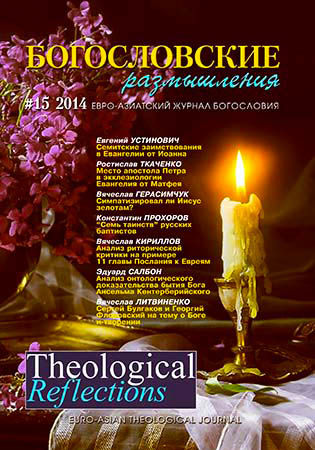An Analysis of Rhetorical Criticism as Exemplified by Hebrews Chapter 11
DOI:
https://doi.org/10.29357/issn.2521-179X.2014.15.110Keywords:
Rhetorical Criticism, Hebrews Chapter 11, New Testament, Epistles rhetorical effect, Rhetorical analysis, Methods of studying the BibleAbstract
This article is an attempt to learn the ba sics of rhetorical analysis of the biblical text as one of the methods for studying the Bible, to see its strengths and weaknesses. Is this method of “hermeneutical sophisti cation” far from actual practice, or can it make a real contribution to understanding the meaning attached to the text by the author? To achieve this goal, a brief over view of the history of rhetorical criticism of the New Testament is given, the gener al scheme of rhetorical analysis is present ed, and then, using this approach, a study of the 11th chapter of Hebrews is made. Rhetorical analysis of Hebrews 11 shows that the author uses the kind of rhetoric and strategy that would be effective in the given situation. The dominant rhetorical method used by the author in chapter 11 is anaphora the repetition of initial words.
This method allowed the author to show a large number of examples of heroic expres sions of faith throughout salvation history. The author also uses paronomasia, staccato effect, asyndeton, and polysyndeton, izokolon, chiasmus, a rhetorical question, contrast and a statement about the lack of time. These techniques are aimed at main taining the basic rhetorical method (anaphora) and serve to achieve the main objective by creating the impression of a large number of similar examples that could be cited to confirm the author's words. In addition, rhetorical analysis is helpful in determining the author's purpose in establishing the boundaries of semantic passages within the chapter, and shows exactly how the author presented and proved his main assertion (11:12). Despite the prevailing view that in the New Testament epistles rhetorical effect was achieved largely through compositional techniques, it is observed that the author of the book of Hebrews actively uses phonetic techniques. In addition, rhetorical analysis confirms the high quality and beauty of the literary style of the author of Hebrews.
References
- Alexandrov, D. (2000). Rhetoric. Moscow: Unity.
- Aristotle. Rhetoric. http://lib.ru/POEEAST/ARISTOTEL/ritoriki.txt (august 31, 2013)
- Asensio M. Gustavo (1996). Halliday’s Functional Grammar as Heir to New Testament Rhetorical Criticism // The rhetorical interpretation of Scripture: Essays from the 1996.
- Malibu conference. Ed. Stanley E. Porter; Dennis L. Stamps. Pp. 84 – 107. Sheffield Academic Press, England.
- Cosby R. Michael (1988). The rhetorical composition and function of Hebrews 11. In light of example list in antiquity. MERCER.
- Olbricht H. Thomas (1996).Classical rhetorical criticism and historical reconstruction: a critique // The rhetorical interpretation of Scripture: Essays from the 1996 Malibu conference. Ed. Stanley E. Porter; Dennis L. Stamps. Pp. 108 – 124. Sheffield Academic Press, England.
- Watson F. Duane (1997). Rhetorical Criticism, New Testament // Dictionary of Biblical Interpretation. K – Z. Pp. 399-402. Ed. Hayes J. Abingdon Press, Nashville.
- Watson F. Duane (2003). Rhetorical criticism / / Jesus and the Gospel. Ed. Green. J. McKnight; Marshall G. 528-531. M.: BBI.
- Watson F. Duane (1996). The contributions and limitations of Greco-Roman rhetorical theory for constructing the rhetorical and historical situations of a Pauline epistle // The rhetorical interpretation of Scripture: Essays from the 1996 Malibu conference. Ed. Stanley E. Porter; Dennis L. Stamps. Pp. 125 – 151. Sheffield Academic Press, England.
- Wroth W. M. (1997). Rhetorical Criticism, Hebrew Bible // Dictionary of Biblical Interpretation. K – Z. Pp. 396-399. Ed. Hayes J. Abingdon Press, Nashville.
Downloads
How to Cite
Issue
Section
License
Copyright (c) 2020 Vyacheslav KIRILLOV

This work is licensed under a Creative Commons Attribution-NonCommercial 4.0 International License.
All articles published in the Journal are distributed under a Creative Commons Attribution-NonCommercial 4.0 International License
By submitting an article for publication in Theological Reflections: Eastern European Journal of Theology the author grants the editors the right to publish the article and distribute it in electronic and print form.
The author reserves all copyrights and the right to use the materials of the article in whole or in part for educational purposes, to write his own dissertations, to prepare abstracts, conference reports, oral presentations, etc., as well as post electronic copies of articles (including the final electronic version downloaded from the journal’s official website) on non-commercial web-resources without the consent of the editorial board and founders.



